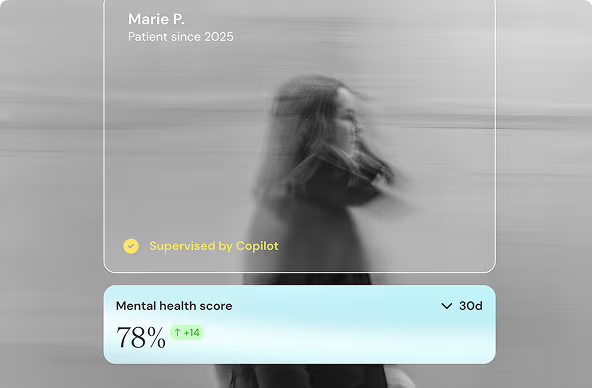Your AI Agents to advance mental health care
Our AI turns complex data into advanced insights, to simplify care and improve patient outcomes.
Only 7% of patients living with a serious mental illness receive adequate care.
We help improve that.
Callyope's AI agents collect real- time data from both doctor and patient, to create insights that save you precious time and improve care.
Trusted by leading research partners and clients

Summarise medical cases
Extract and summarise key details from complex medical records in seconds. Clinicians can quickly understand a patient’s history, symptoms, and treatment path — all in one view.
Monitor patients remotely
Callyope can track and analyse symptoms through low-touch patient interactions, speech and sensor data. Clinicians get early signals of change, enabling timely, personalised interventions to avoid relapses.
Draft reports with ease
Writing reports doesn’t have to eat into care time. Callyope creates clear, structured, first drafts of reports, helping clinicians save time and focus on what matters most.
Medical coding
Callyope can analyse psychiatric observations and reports to identify gaps in medical codes. This saves you time and secures accurate funding.
The first foundation model for psychiatry, grounded in science.
Through speech, sleep data, and activity levels, Callyope's AI is capable of analysing patient behaviours and reasoning within a medical context to provide clinicians with reliable, patient-specific insights.
Tried and tested
Our foundation model can assess depression, anxiety, insomnia, fatigue, cognitive decline, suicidal ideation, and more. Eight trials are ongoing with leading institutions.
Built by world-class experts
Our team is made of world-class engineers and researchers with deep expertise in AI, neurosciences & healthcare.
Validated by research
SLAP: Learning Speaker and Health-Related Representations from Natural Language Supervision
Ando* et al, 2025
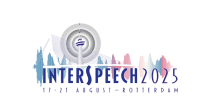
In-context learning capabilities of Large Language Models to detect suicide risk among adolescents from speech transcripts
Roquefort* et al, 2025
Got questions?
Here is everything you need to know to get started with Callyope.
What's the difference between our AI Agents & our Foundation Model?
Clinicians log into our platform to access what we call "Callyope agents" - AI assistants that make their work faster and smarter. Some help with daily tasks, like reviewing medical notes or coding visits. Others support clinical decisions by continuously tracking patients’ symptoms through speech. All of them are powered by our mental health-specific foundation model.
What medical documents can you analyze?
We integrate with your EHR to access biology, hospitalisation and consultation reports, prescriptions, etc. Clinicians can also upload files through our web app, and patient can share documents via our mobile app.
All formats are supported – digital, scanned, or handwritten
Can you show me where information displayed comes from?
Yes. All information is traceable to source documents. Click on any piece of information for verification.
Can you certify the accuracy of your summary tool?
We are currently conducting studies to validate the quality of our tools and measure time savings for clinicians. However, bear in mind our technology assists clinical judgment – it doesn’t replace it.
What reports can you draft?
All types. Select the relevant documents, and we will generate a first draft or hospitalization reports, referral letters, and any other clinical document.
You review, edit as needed and you are done.
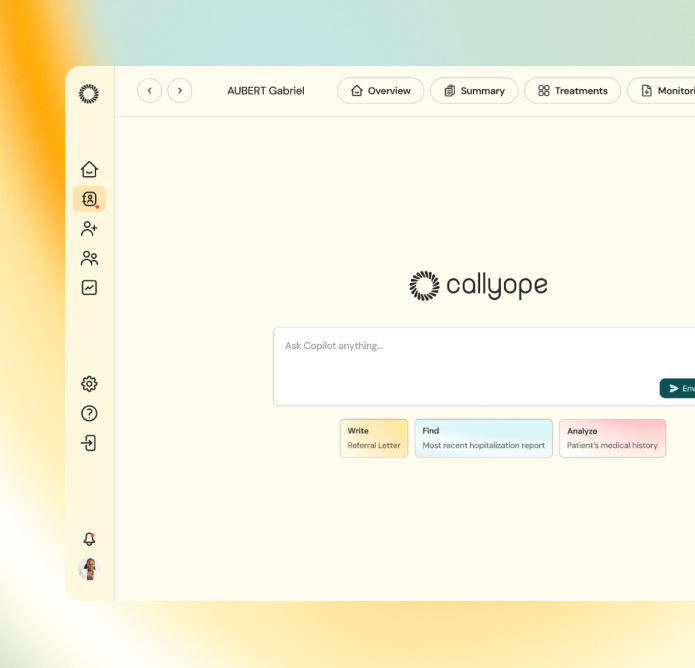
What’s the difference between Callyope Copilot and the Foundation model?
Callyope Copilot is our integrated clinical platform that can handles both clinical tasks (symptom assessment, monitoring) and administrative work (summaries, reports). All these AI-based use cases are powered by our proprietary Foundation model.
How can you assess symptoms based on behavioral data such as speech or sleep?
Mental health conditions create measurable changes in speech patterns, sleep and activity. For example, schizophrenia often involves disorganized speech, while bipolar mania typically shows pressured speech and reduced sleep. Our model detect these changes.
What’s the difference between foundation models and “voice biomarkers” technologies?
Voice biomarkers target specific features—such as lexical diversity or speech rate—to assess a single symptom in one condition. Since many mental health conditions share common symptoms, we are building a single foundation model to assess most symptoms across most conditions. This approach offers better performance and greater robustness to clinical variability.
Are you still looking for research partners?
We are partnering with leading academic centers to validate our technology, but we always welcome additional research collaborations.

What’s the purpose of your monitoring platform?
We aim to make mental health monitoring more objective and continuous. When you use our app, your doctor can track symptoms between visits and make better-informed medical decisions.
Are you going to analyze my microphone all day?
No, of course not. You control when and how your data is analyzed. Options include keeping a voice journal, allowing call from trusted contacts through our app, or participating in automated phone conversations.
Can I use your monitoring tool on my own, if I’m a patient?
No, our platform requires medical supervision. If you think it could help, discuss it with your doctor.
Is my data safe with Callyope?
Yes. Your data remains on our secure servers, which comply with HDS and GDPR regulations. We maintain the highest cybersecurity standards, including ISO27001 certification.

What we’re thinking about
Read the latest updates, ideas, and insights from the Callyope team.
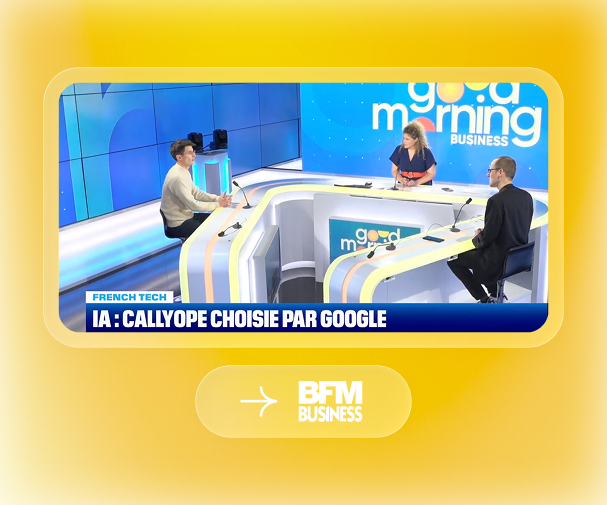
Martin Denais, co-founder and CEO, Live on BFM Business
Live appearance on Good Morning Business, hosted by Laure Closier.

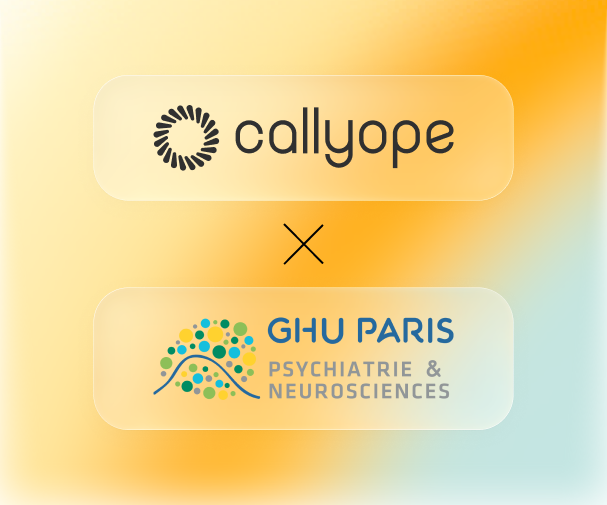
GHU Paris Agreement
Callyope & GHU Paris announce strategic R&D partnership.

Want to see Callyope Copilot in action?
Discover how Callyope Copilottransforms mental health care with clinically grounded, AI-powered solutions. Let us walk you through a personalised demo to show how it can streamline your workflow and improve patient outcomes.











